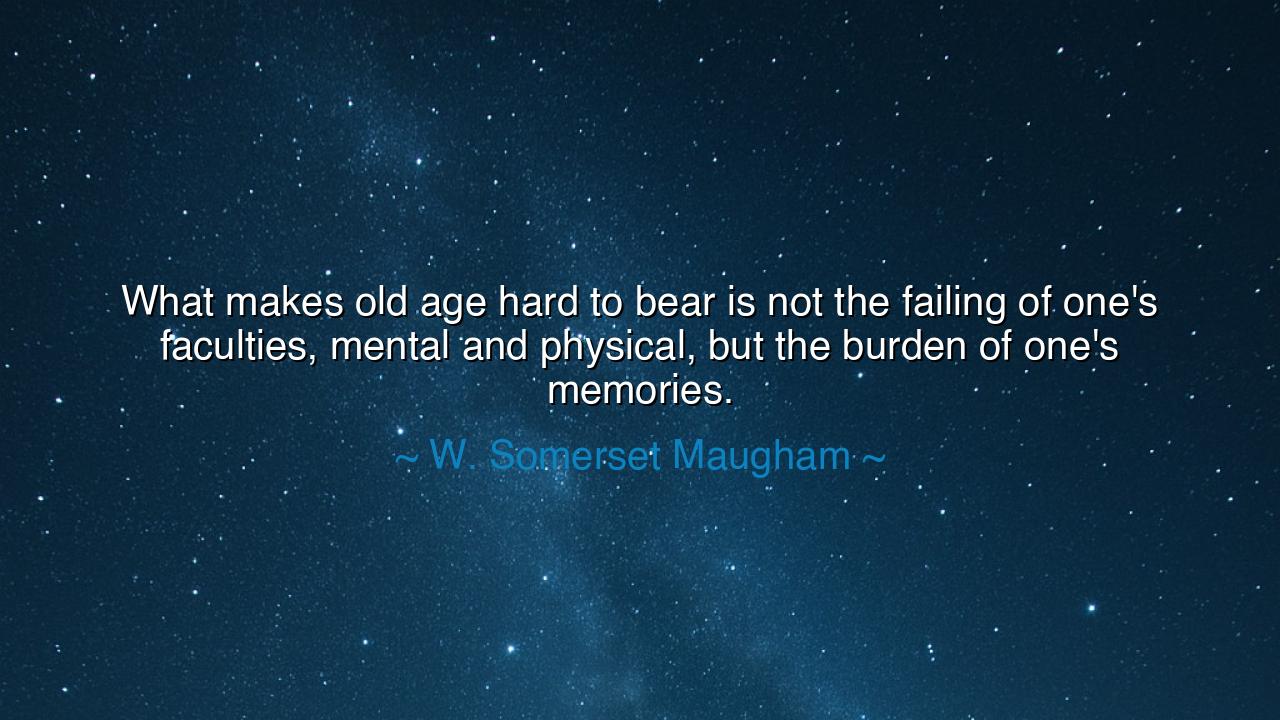
What makes old age hard to bear is not the failing of one's
What makes old age hard to bear is not the failing of one's faculties, mental and physical, but the burden of one's memories.






In the course of life, as the years pass and the body begins to show the marks of time, many fear the decline of their faculties—the physical and mental weaknesses that come with old age. But, as the great writer W. Somerset Maugham so insightfully remarks, "What makes old age hard to bear is not the failing of one's faculties, mental and physical, but the burden of one's memories." These words pierce to the heart of a deep truth about the human condition. It is not so much the loss of the body’s strength that creates suffering, but the weight of the past, the memories that linger and, sometimes, overwhelm the soul. The very essence of life—our experiences, our triumphs, our losses—can become both a source of wisdom and a burden that becomes harder to carry with each passing day.
The ancients understood this tension between the fading body and the enduring mind. Socrates, in his reflections on aging, often spoke of the body’s inevitable decline, but he emphasized that the soul—the true essence of a person—could remain vibrant and engaged, regardless of the physical limitations of age. Yet, Socrates also acknowledged the burden of memories: the regret of what could not be changed, the longing for lost opportunities, and the weight of experiences that, if not properly understood, could cloud the mind. In the end, it was the soul's wisdom and its ability to process and release these burdens that determined the true peace one could find in old age.
Consider the story of King Solomon, one of the wisest men to have ever lived, who, in his later years, reflected deeply on his life. Solomon, having experienced the heights of power, wisdom, and wealth, saw the world through a lens shaped by decades of decisions, victories, and failures. In the Book of Ecclesiastes, he writes: “To everything there is a season,” but later, he confesses a deep sense of vanity and futility in his accumulated experiences. Even Solomon, the king who possessed unparalleled wisdom, was burdened by the memories of his choices, the weight of a life lived fully but with many regrets. His story echoes Maugham's insight: it is not the fading of the faculties that makes old age difficult, but the constant reflection on the past—the memories that both define and sometimes haunt us.
Another striking example can be found in the life of Nelson Mandela, who spent 27 years in prison, enduring physical and mental hardships that would have broken lesser men. Upon his release, Mandela was faced not only with the physical challenges of age but with the immense weight of his memories—memories of imprisonment, loss, and the years of struggle. Yet, unlike many, Mandela transformed those memories, not allowing them to crush his spirit but using them to fuel his determination to rebuild his country and heal the wounds of apartheid. He understood that while memories shape us, it is our choice—our capacity to process them—that ultimately determines how they affect us. His ability to turn suffering into purpose is a lesson that speaks directly to the heart of Maugham’s words: that the burden of memory is only heavy when we do not have the wisdom or strength to release it.
The lesson Maugham offers is not one of despair but of awareness—the recognition that while the passing of time is inevitable, we do not have to be enslaved by the memories of our past. Memories can be powerful, but they are not meant to be carried forever. In old age, the key is to reconcile with the past, to accept what cannot be changed, and to find peace in the present. As Marcus Aurelius, the Stoic philosopher and emperor, once wrote: "The happiness of your life depends upon the quality of your thoughts." This wisdom teaches us that peace in old age comes not from the body’s strength, but from the clarity of mind and the ability to release the burdens of memory.
In our own lives, we must learn to engage with our memories in a healthy way. Acknowledging the past, but not letting it define us or hold us hostage, is one of the greatest challenges we can face. Reflect, yes, on the lessons learned from your experiences, but do not let the regrets or unresolved griefs of the past weigh you down. As Socrates and Mandela did, we must use our memories as tools for growth, wisdom, and compassion, not as chains that bind us to past mistakes or losses. Let us take action by forgiving ourselves and others, embracing the present moment, and finding peace in the journey rather than in the burden of memories.
In the end, let us remember that while age may bring physical limitations, it does not diminish our capacity for peace and purpose. As Maugham wisely points out, the true weight of old age is not in the body’s decline, but in how we relate to our memories. By acknowledging this truth and embracing the freedom that comes from releasing the past, we can find a profound sense of peace and clarity in our later years. Just as the ancients taught, true wisdom is the ability to live fully in the present, no matter how many years have passed, and to understand that our memories, while precious, do not need to be our burden.






AAdministratorAdministrator
Welcome, honored guests. Please leave a comment, we will respond soon